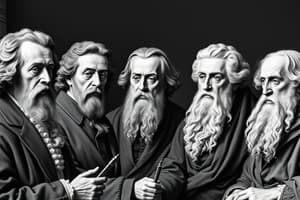Podcast
Questions and Answers
What was a significant outcome of Enlightenment ideas on political power?
What was a significant outcome of Enlightenment ideas on political power?
In what year did black men somewhat gain the right to vote in the United States?
In what year did black men somewhat gain the right to vote in the United States?
What change occurred regarding voting rights from 1776 to early 1800s in the United States?
What change occurred regarding voting rights from 1776 to early 1800s in the United States?
What economic shift accompanied the revolutions and political changes during the Enlightenment period?
What economic shift accompanied the revolutions and political changes during the Enlightenment period?
Signup and view all the answers
What common theme underpinned the nationalist movements during the Enlightenment?
What common theme underpinned the nationalist movements during the Enlightenment?
Signup and view all the answers
What is the primary ideological contribution of the Enlightenment?
What is the primary ideological contribution of the Enlightenment?
Signup and view all the answers
Which Enlightenment thinker is associated with the idea that knowledge is gained through senses and experimentation?
Which Enlightenment thinker is associated with the idea that knowledge is gained through senses and experimentation?
Signup and view all the answers
What does the concept of Natural Rights suggest?
What does the concept of Natural Rights suggest?
Signup and view all the answers
How did the Enlightenment thinkers view the role of government?
How did the Enlightenment thinkers view the role of government?
Signup and view all the answers
Which movement is considered a precursor to the Enlightenment?
Which movement is considered a precursor to the Enlightenment?
Signup and view all the answers
What form of belief is characterized by the view that God created the universe but does not intervene in it?
What form of belief is characterized by the view that God created the universe but does not intervene in it?
Signup and view all the answers
What was a significant social practice among Enlightenment thinkers in France to discuss and debate ideas?
What was a significant social practice among Enlightenment thinkers in France to discuss and debate ideas?
Signup and view all the answers
What was a direct impact of the Enlightenment on global political movements?
What was a direct impact of the Enlightenment on global political movements?
Signup and view all the answers
Study Notes
Enlightenment and Revolutions
- The Enlightenment was an intellectual movement applying rationalist and empiricist thinking to the natural world and human relationships.
- It originated in the Scientific Revolution, drawing on empiricism (knowledge through senses and experimentation) from Francis Bacon and rationalism (reason over emotion) from René Descartes.
- The Renaissance also influenced the Enlightenment, promoting humanism (focus on human potential over religious dogma).
- The Enlightenment questioned existing religious and political ideologies.
Key Enlightenment Concepts
- Deism: Belief in a creator God who established natural laws but does not intervene.
- Atheism: Rejection of religious belief and any divine beings.
- Individualism: Focus on the individual as the basic unit of society.
- Natural Rights: Inherent rights individuals possess, cannot be violated.
- Social Contracts: Societies create governments to protect natural rights.
Enlightenment's Spread and Influence
- Enlightenment thinkers in England (Locke, Hobbes) and France (Philosophes) popularized ideas.
- French Philosophes published works and debated ideas in salons (public meetings).
- Key French Enlightenment ideas: freedom of speech/religion, separation of powers, checks and balances.
- Enlightenment ideas spread to Europe and other parts of the world.
- The Enlightenment fostered subsequent movements like feminism, social justice/civil rights, and judicial/prison reform.
Enlightenment and Revolutions Worldwide
- The Enlightenment provided the framework for the American, French, Haitian, and Latin American revolutions.
- Revolutions challenged established traditions and power structures.
- Enlightenment ideas fueled nationalist movements - sense of identity and commonality based on shared ideals.
Expansion of Voting Rights
- In the United States, voting rights evolved gradually.
- Initially, only land-owning white males voted.
- Over time, the right to vote expanded to include more groups.
Enlightenment and Industrial Revolution
- The Industrial Revolution, a transition from agricultural to industrial economies, occurred concurrently with the Enlightenment.
- Peasant revolts in Europe, pushing states towards abolishing serfdom/granting freedoms to peasants.
Studying That Suits You
Use AI to generate personalized quizzes and flashcards to suit your learning preferences.
Description
Explore key concepts of the Enlightenment, an intellectual movement that emphasized reason, empiricism, and individual rights. This quiz covers major ideas such as Deism, atheism, natural rights, and social contracts, and their impact on modern political thought. Test your knowledge of how these ideas reshaped society and challenged traditional beliefs.




